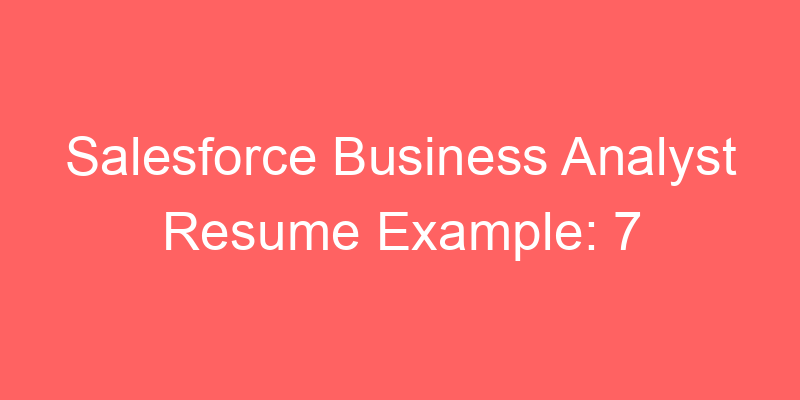Land Your Dream Salesforce CPQ Dev Job: The Resume That’ll Get You Noticed (Before It’s Too Late!)
Meta Title: Salesforce CPQ Dev Resume Guide
Meta Description: Crafting a killer Salesforce CPQ Developer resume? This guide provides actionable tips, keywords, and examples to help you land your dream job!
Are you a Salesforce developer with a passion for the complex world of Configure, Price, Quote (CPQ)? The demand for skilled Salesforce CPQ developers is booming, but competition is fierce. Landing your dream job requires more than just technical prowess; it starts with a resume that truly shines. This article provides a comprehensive guide to crafting a standout Salesforce CPQ Developer resume, giving you the edge you need to get noticed and get hired.
Why a Strong Salesforce CPQ Developer Resume Matters
The Salesforce ecosystem is constantly evolving, and CPQ is a critical component for many businesses. Companies rely on CPQ systems for accurate quoting, efficient order management, and streamlined sales processes. This translates into a high demand for developers who understand the intricacies of CPQ and can build and maintain these vital systems.
A well-crafted resume is your first impression. It’s your chance to showcase your skills, experience, and passion for Salesforce CPQ. A poorly written or generic resume will likely be overlooked. This article will help you avoid that fate.
H2: Key Components of a Winning Salesforce CPQ Developer Resume
Your resume should be clear, concise, and tailored to the specific requirements of the Salesforce CPQ Developer role. Here’s a breakdown of the essential components:
- Contact Information: Include your full name, professional email address, phone number, and a link to your LinkedIn profile. Ensure your LinkedIn profile is up-to-date and reflects the information in your resume.
- Summary/Objective (Optional, but Recommended): A brief, impactful statement (3-4 sentences) that highlights your key skills, experience, and career goals. Tailor this to the specific job description.
- Example: Highly motivated Salesforce CPQ Developer with 3+ years of experience in designing, developing, and implementing CPQ solutions. Proficient in Apex, Visualforce, and Lightning Web Components (LWC). Seeking a challenging role where I can leverage my expertise to drive business value and contribute to innovative CPQ implementations.
- Skills: This is a crucial section. List both your technical and soft skills. Be specific and use keywords from the job description.
- Technical Skills:
- Salesforce CPQ (e.g., Product Configuration, Pricing, Quote Templates, Order Management)
- Apex
- Visualforce (if relevant)
- Lightning Web Components (LWC)
- SOQL/SOSL
- Salesforce APIs
- Integration experience (e.g., with ERP systems)
- Data migration and management
- Version control (e.g., Git)
- Testing frameworks (e.g., Apex testing)
- Soft Skills:
- Problem-solving
- Communication (written and verbal)
- Teamwork
- Time management
- Adaptability
- Attention to detail
- Technical Skills:
- Experience: This is the heart of your resume. Use the STAR method (Situation, Task, Action, Result) to describe your accomplishments.
- For each role:
- Include the job title, company name, dates of employment, and location.
- Use action verbs to describe your responsibilities and accomplishments.
- Quantify your achievements whenever possible (e.g., “Improved quoting process efficiency by 20%”).
- Focus on CPQ-specific projects and responsibilities.
- For each role:
- Education: List your degrees, certifications (Salesforce CPQ Specialist Certification is highly desirable!), and any relevant coursework.
H2: Crafting Compelling Experience Sections for Salesforce CPQ
The experience section is where you prove your value. Go beyond simply listing your responsibilities; demonstrate your impact.
- Focus on CPQ Projects: Highlight projects where you directly worked with Salesforce CPQ. Describe the challenges you faced, the solutions you implemented, and the results you achieved.
- Showcase Your Expertise: Demonstrate your understanding of CPQ concepts such as product configuration, pricing rules, quote templates, and order management.
- Use Action Verbs: Start each bullet point with strong action verbs (e.g., “Developed,” “Implemented,” “Managed,” “Optimized,” “Troubleshooted”).
- Quantify Your Results: Whenever possible, use numbers to demonstrate your achievements (e.g., “Reduced quote generation time by 15%,” “Improved quote accuracy by 10%”).
- Example:
- Salesforce CPQ Developer | ABC Company | 2020 – Present
- Designed and implemented custom pricing rules within Salesforce CPQ, resulting in a 12% increase in average deal size.
- Developed and maintained CPQ quote templates, improving the efficiency of quote generation by 20%.
- Integrated Salesforce CPQ with the company’s ERP system using Salesforce APIs, streamlining order processing.
- Provided ongoing support and troubleshooting for the CPQ system, ensuring optimal performance.
- Salesforce CPQ Developer | ABC Company | 2020 – Present
H3: Keywords: The Secret Weapon
Keywords are crucial for passing Applicant Tracking Systems (ATS) and getting your resume seen by human eyes. Research the specific keywords used in the job descriptions you’re targeting and strategically incorporate them into your resume.
- CPQ-Specific Keywords: Product Configuration, Pricing Rules, Quote Templates, Order Management, Discounting, Bundling, CPQ Data Model, Guided Selling, Price Rules, Price Actions, Quote Lines.
- Salesforce Platform Keywords: Apex, Visualforce, Lightning Web Components (LWC), SOQL/SOSL, Salesforce APIs, Salesforce Flows, Triggers, Batch Apex.
- Other Relevant Keywords: Agile, Scrum, DevOps, Integration, Data Migration, Version Control, Testing.
H2: Formatting and Presentation
- Keep it Concise: Aim for a one- to two-page resume, depending on your experience.
- Choose a Clean Layout: Use a professional and easy-to-read font (e.g., Arial, Calibri, Helvetica).
- Use White Space: Don’t overcrowd your resume. Ample white space makes it easier to read.
- Proofread Carefully: Errors can make your resume look unprofessional. Proofread multiple times and have a friend or colleague review it.
- Save as PDF: This ensures your formatting is consistent across different devices.
H2: Tailoring Your Resume for Each Application
Avoid sending a generic resume. Customize your resume for each job application.
- Read the Job Description Carefully: Identify the key skills and requirements.
- Highlight Relevant Experience: Adjust your experience section to emphasize the skills and projects most relevant to the job description.
- Use Keywords from the Job Description: Incorporate the keywords used in the job description into your resume.
Conclusion: Your Path to Salesforce CPQ Success
Landing your dream Salesforce CPQ Developer job requires a strong resume that effectively showcases your skills and experience. By following the tips outlined in this guide, you can create a compelling resume that gets you noticed by recruiters and hiring managers. Remember to tailor your resume to each job application, use relevant keywords, and quantify your achievements whenever possible. Good luck with your job search!
Further Resources:
- Salesforce CPQ Specialist Certification Guide: [Link to Salesforce Trailhead or other relevant resource]
- Salesforce Developer Documentation: [Link to Salesforce Developer Documentation]
- LinkedIn Learning Courses on CPQ Development: [Link to LinkedIn Learning or other online learning platforms]
- Salesforce CPQ Community Forums: [Link to Salesforce Community Forums]




